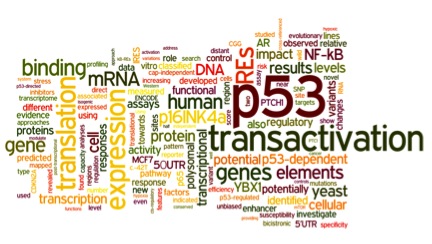Overview
We study sequence-specific transcription factors, their regulated gene networks and the mechanisms linking transcriptional activation at promoter level, mRNA translation efficiency and cell outcome.

Research directions
Our main focus is the tumor suppressor protein p53 and, to some extent, its family members p63 and p73. In the past, we also studied examples of transcriptional cooperation between p53 and Estrogen Receptors or NF-kB.
We use model systems, including different established cancer cell line, and also specialize in exploiting the yeast S. cerevisiae as it provides a highly defined, genetically tractable, and tunable assay system, a.k.a. an in vivo test tube.
Current projects
We are focusing on mechanisms that coordinate transcriptional selection and mRNA translation efficiency resulting in p53-dependent apoptosis of cancer cells treated with small molecules targeting MDM2.
We are also continuing studies aiming at:
- Dissect features of p53 binding sites contributing to p53 transactivation
- Validate new small molecules reactivating the p53 pathway in cancer cells
- Understand the functions of the RNA binding proteins and RNA helicase DHX30
- Discover and characterize common genetic variants impacting on mRNA translation efficiency
Group members
- Alberto Inga, PI
- Meriem Hadjer Hamadou, PhD student
Recent past members
- Bartolomeo Bosco, PhD graduate
- Dario Rizzotto, PhD graduate
Collaborations (external to CIBIO)
- Lucilia Saraiva, University of Porto, Portugal
- Gabriella Viero, Istituto di Biofisica, CNR, Trento
- Paola Briata, Gene Expression Regulation Lab. IRCCS San Martino Hospital, Genoa, Italy
- Lorenzo Montanaro, University of Bologna, Italy
- Martin Dutertre, Institut Curie, Orsay, Cedex, France
- Jean-Jacques Diaz, Cancer Research Center of Lyon, France
- Gilberto Fronza, IRCCS AOU San Martino –IST, Genoa, Italy
- Vaclav Brazda, Institute of Biophysics Brno, Czech Republic
- Tali Haran, Technion, Haifa, Israel
- Marco Marcia, EMBL, Grenoble, France
Selected publications
Valentini S., Marchioretti C., Bisio A., Rossi A., Zaccara S., Romanel A. Inga A. TranSNPs: A class of functional SNPs affecting mRNA translation potential revealed by fraction-based allelic imbalance. iScience. 2021 Nov 27;24(12):103531. doi: 10.1016/j.isci.2021.103531.
Bosco B, Rossi A, Rizzotto D, Hamadou MH, Bisio A, Giorgetta S, Perzolli A, Bonollo F, Gaucherot A, Catez F, Diaz JJ, Dassi E, Inga A. DHX30 Coordinates Cytoplasmic Translation and Mitochondrial Function Contributing to Cancer Cell Survival. Cancers. 2021 Aug 31;13(17):4412. doi: 10.3390/cancers13174412.
Ramos H, Soares MIL, Silva J, Raimundo L, Calheiros J, Gomes C, Reis F, Monteiro FA, Nunes C, Reis S, Bosco B, Piazza S, Domingues L, Chlapek P, Vlcek P, Fabian P, Rajado AT, Carvalho ATP, Veselska R, Inga A, Pinho E Melo TMVD, Saraiva L. A selective p53 activator and anticancer agent to improve colorectal cancer therapy. Cell Rep. 2021 Apr 13;35(2):108982. doi: 10.1016/j.celrep.2021.108982.
Senitzki A, Safieh J, Sharma V, Golovenko D, Danin-Poleg Y, Inga A, Haran TE. The complex architecture of p53 binding sites. Nucleic Acids Res. 2021 Feb 22;49(3):1364-1382. doi: 10.1093/nar/gkaa1283.
Rizzotto D, Zaccara S, Rossi A, Galbraith MD, Andrysik Z, Pandey A, Sullivan KD, Quattrone A, Espinosa JM, Dassi E, Inga A. Nutlin-Induced Apoptosis Is Specified by a Translation Program Regulated by PCBP2 and DHX30. Cell Rep. 2020 Mar 31;30(13):4355-4369.e6. doi: 10.1016/j.celrep.2020.03.011.
Gomes S, Bosco B, Loureiro JB, Ramos H, Raimundo L, Soares J, Nazareth N, Barcherini V, Domingues L, Oliveira C, Bisio A, Piazza S, Bauer MR, Brás JP, Almeida MI, Gomes C, Reis F, Fersht AR, Inga A, Santos MMM, Saraiva L. SLMP53-2 Restores Wild-Type-Like Function to Mutant p53 through Hsp70: Promising Activity in Hepatocellular Carcinoma. Cancers. 2019 Aug 10;11(8):1151. doi: 10.3390/cancers11081151.
